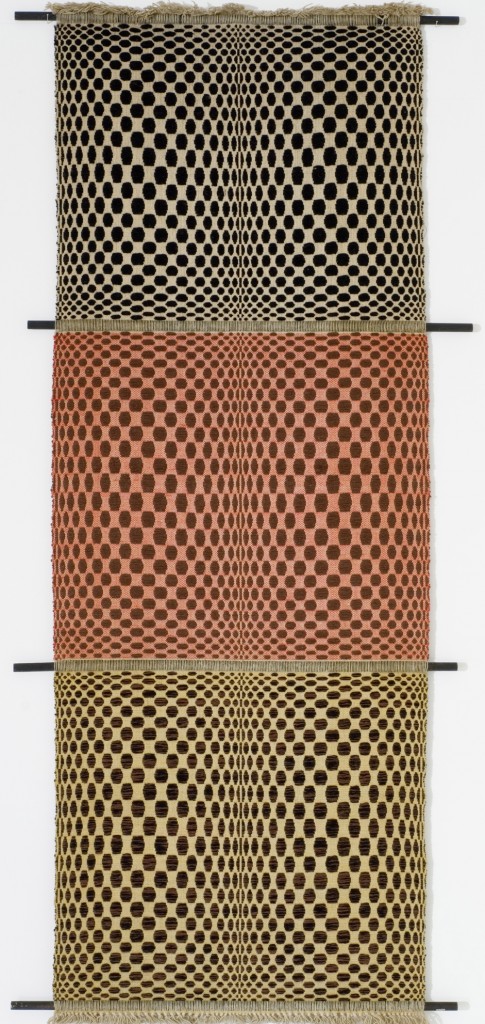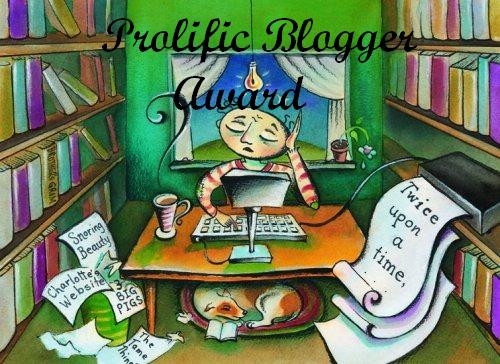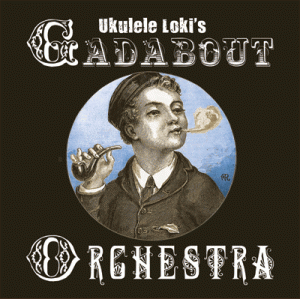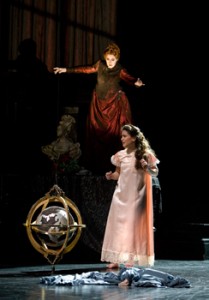By Bob Hicks
A few Friday hot links to go with your early-weekend bagel and eggs:

Leave ’em hanging: In this morning’s A&E section of The Oregonian I reviewed Laurie Herrick: Weaving Yesterday, Today and Tomorrow, the new show at the Museum of Contemporary Craft. Herrick was a prominent loom weaver in Portland beginning in the late 1950s; she died in 1995. And she was well aware of art trends, as her ca. 1970 Op Art wall hanging Three Giraffes, shown here, attests. Teaser: “If Jackson Pollock created action painting, this is action weaving.” Read the review here.
Coolest-sounding show in town: Speaking trippingly on the tongue, that would be BoomCrackleFly, the brashly smooshed-together title of Charise Castro Smith‘s new play, which opens tonight at Miracle Theatre.
On Blogorrhea, Mr. Mead Hunter has a crackling-good interview of his own with Smith, in which he questions her, among other things, about how the theater is going to pull off the vision of “people bobbing in a world covered in water.” To which, in part, she replies: “I think one of the great things about theater is the fact that if an actor stands on stage and says something is true, then at that moment it’s true. It’s the huge imaginative possibility of theater to call all sorts of things into being with language.” Read the interview here.
Paper dance: What’s old is new. What’s outre is cool. We’re talking newspapers. The printed page. Good old-fashioned hold-it-in-your-hands-and-flip-the-page minimalism. Who’s reviving this retro craft? Why, Portland’s contemporary dance scene, that’s who (or what). We’ve been hearing rumors of the impending birth of a local dance newspaper, and now Marty Hughley has the inside scoop on Oregon Live (which is the not-printed version of the printed Oregonian). It’ll be called Front. Read the story here. And read Alison Hallett’s take on The Mercury’s Blogtown here.
Lanford Wilson, R.I.P.: The noted American playwright, whose many works were frequently staged in Portland, died on Thursday at age 73. Wilson‘s career spanned Off-Off, Off, and Broadway in addition to lots and lots of regional productions, and ranged from early hits such as The Hot l Baltimore to his Talley Trilogy (Talley & Son, Talley’s Folly, Fifth of July) and the high-octane Burn This. Several seasons ago he was the featured artist for Profile Theatre, the Portland company that spends each of its seasons exploring the works of a single playwright. At a time when household-name playwrights are pretty much a thing of the past (is Edward Albee the last of that breed?) Wilson was one of the noble practitioners who have kept the fabulous invalid alive and vigorously kicking. Read Margalit Fox’s obituary for the New York Times here.
*
Laurie Herrick, “Three Giraffes,” 1970. Linen, cotton and wool, 72 x 32 inches. Collection of Museum of Contemporary Craft in partnership with Pacific Northwest College of Art, gift of Ken Shores; 2006.05.01. Photo: Dan Kvitka.





 I come home from a few days in the rainylands to the north to discover that it’s been pouring in Portland — not just rain, but bad news.
I come home from a few days in the rainylands to the north to discover that it’s been pouring in Portland — not just rain, but bad news. “This score is my bible,”
“This score is my bible,” 
 More poetically (and less argumentatively), the use of punctuation is a handy writers’ tool in the construction of mood and suggestion: “He’s driving fast fast fast” is simply faster to a reader’s eye than “He’s driving fast, fast, fast” — and if the blur of speed is what you’re trying to get across, using commas is like driving in the Indianapolis 500 with your emergency brake on.
More poetically (and less argumentatively), the use of punctuation is a handy writers’ tool in the construction of mood and suggestion: “He’s driving fast fast fast” is simply faster to a reader’s eye than “He’s driving fast, fast, fast” — and if the blur of speed is what you’re trying to get across, using commas is like driving in the Indianapolis 500 with your emergency brake on. 